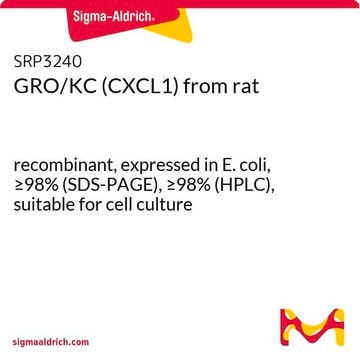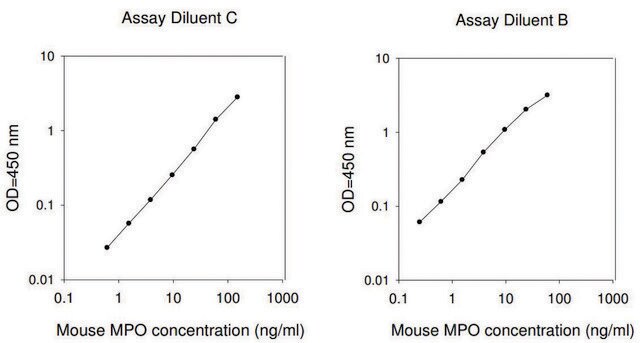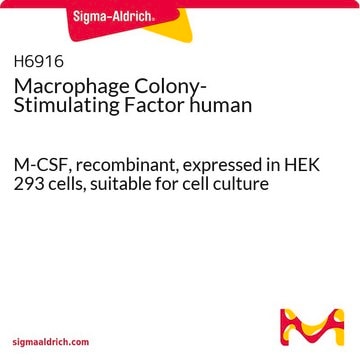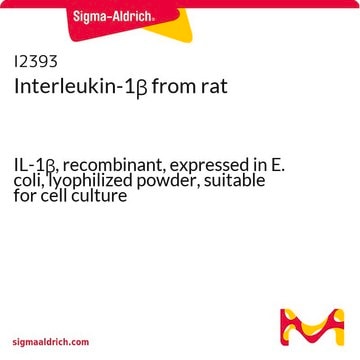SRP4210
GRO/KC from mouse
recombinant, expressed in E. coli, ≥98% (SDS-PAGE), ≥98% (HPLC)
Synonyme(s) :
CXCL1, GRO α, GRO1, Growth-regulated α protein, NAP-3
Se connecterpour consulter vos tarifs contractuels et ceux de votre entreprise/organisme
About This Item
Produits recommandés
Source biologique
mouse
Produit recombinant
expressed in E. coli
Pureté
≥98% (HPLC)
≥98% (SDS-PAGE)
Forme
lyophilized
Puissance
10-100 ng/mL
Poids mol.
~7.8 kDa
Conditionnement
pkg of 20 μg
Impuretés
endotoxin, tested
Numéro d'accès NCBI
Numéro d'accès UniProt
Conditions d'expédition
wet ice
Température de stockage
−20°C
Informations sur le gène
mouse ... Cxcl1(14825)
Description générale
Growth-regulated oncogenes (GRO)/keratinocyte chemoattractant (KC) belongs to the growing inflammatory protein superfamily. KC is characterized with four conserved cysteine residues with a CXC motif.
Mouse KC (also known as mouse GRO-α) belongs to the C-X-C family of chemokines. Mouse KC is a 7.8 kDa protein containing 72 amino acid residues.
Actions biochimiques/physiologiques
Growth-regulated oncogenes (GRO)/keratinocyte chemoattractant (KC) plays a vital role in wound healing and inflammation. In rat, serum levels of GRO/KC can be used as a predictive biomarker for inhibitory effect of chemopreventive agents on esophageal carcinogenesis.
Forme physique
Sterile filtered and then lyophilized without any additives.
Reconstitution
Centrifuge the vial prior to opening. Avoid freeze-thaw cycles.
Reconstitute in water to a concentration of 0.1-1 mg/mL. This solution can be diluted into other aqueous buffers.
Certificats d'analyse (COA)
Recherchez un Certificats d'analyse (COA) en saisissant le numéro de lot du produit. Les numéros de lot figurent sur l'étiquette du produit après les mots "Lot" ou "Batch".
Déjà en possession de ce produit ?
Retrouvez la documentation relative aux produits que vous avez récemment achetés dans la Bibliothèque de documents.
Cloning and sequencing of a new gro transcript from activated human monocytes: expression in leukocytes and wound tissue.
Iida N A O K O, et al.
Molecular and Cellular Biochemistry, 10(10), 5596-5599 (1990)
Cloning and sequencing of a new gro transcript from activated human monocytes: expression in leukocytes and wound tissue
Iida NAOKO and Grotendorst GR
Molecular Cell Biology, 10(10), 5596-5599 (1990)
Multiple berry types prevent N-nitrosomethylbenzylamine-induced esophageal cancer in rats
Stoner GD, et al.
Pharmaceutical Research, 27(6), 1138-1145 (2010)
Aimalie L Hardaway et al.
Clinical & experimental metastasis, 32(4), 353-368 (2015-03-25)
Increased bone marrow adiposity is a common feature of advanced age, obesity and associated metabolic pathologies. Augmented numbers of marrow adipocytes positively correlate with dysregulated bone remodeling, also a well-established complication of metastatic disease. We have shown previously that marrow
Yuan Sun et al.
The journal of pain : official journal of the American Pain Society, 15(8), 856-866 (2014-06-03)
Chronic opioid consumption increases postoperative pain. Epigenetic changes related to chronic opioid use and surgical incision may be partially responsible for this enhancement. The CXCL1/CXCR2 signaling pathway, implicated in several pain models, is known to be epigenetically regulated via histone
Notre équipe de scientifiques dispose d'une expérience dans tous les secteurs de la recherche, notamment en sciences de la vie, science des matériaux, synthèse chimique, chromatographie, analyse et dans de nombreux autres domaines..
Contacter notre Service technique








